Strong Emotions and New Perspectives for MCCC Travelers to Poland
6/14/19
West Windsor, N.J. – A group of 28 students and faculty members from Mercer County Community College (MCCC) went on a college Study Tour of Poland from May 10-19. They returned with powerful insights and strong emotions to process and absorb.
In a wide-ranging discussion facilitated by Professor Andrea Lynch, coordinator of the Center for Global Education, on June 11, it became clear – often painfully – that the trip made a major impact.
The itinerary included visits to historic sites in Warsaw and Krakow, and culminated with three days in Oświęcim, the town where the Auschwitz-Birkenau concentration camp complex is located.
“I walked in here and literally wanted to cry,” said Amy Scheidell, a Psychology student. She recalled many tearful moments during the trip. One occurred when she found herself drawn to a display of family photos that prisoners had brought with them to the concentration camps. “One elderly man reminded me of my grandfather,” she recalled. “I could not stop staring at his picture. When we left, I took a picture of the photograph – and then I called my dad.”
“Just one month ago we were starting our journey in Poland,” observed Professor of History Dr. Craig Coenen, who led the trip with MCCC English Professors Laura Knight and Jack Tabor.
Coenen noted that students had been preparing for the trip in his class, History of the Holocaust and Other Genocides. “But there is only so much you can prepare,” he said.
Student Kasey Giordano agreed. “At some point, you break. You don’t know when that’s going to happen.” For her, it came after the group visited the factory of Oskar Schindler, who saved many Jews by giving them jobs in his factory. “We were waiting for the bus. Behind us was what had once been a deportation center. I could imagine a family, with suitcases packed, standing there, not knowing where they were going,” she said.
Giordano shared that during the trip she had a recurring dream. “I dreamt that my house had been rearranged,” she said, adding that she has a new perspective on her own life. “For one thing, I realize how good we have it.”
Members of the group recalled many jarring scenes. Craig Levy noted that during his stop in the gas chamber in Auschwitz, he saw people taking pictures. “I wanted to tell them not to do that. It was not respectful to those who were herded to their deaths,” he said.
Kasey McNulty recalled a particularly disturbing moment when she saw three young girls doing the Nazi salute as a photo opp at the camp.
Returning adult student Linda Caffrey thought that perhaps those were times to say something. “You can say it without it coming down like a hammer,” she noted. “In 1932, when Hitler came to power, no one spoke up. We can’t just be bystanders. We have to speak up.”
Even the camp shop, which sells posters, magnets and postcards of scenes in the camps, seemed inappropriate to many. “Who would want these?” pondered several students.
Coenen said that’s a difficult question to answer. “What is appropriate? Is a gas chamber a tourist attraction?”
Group member Sharon Taksler, who serves on the advisory commission for the Mercer County Holocaust, Genocide and Human Rights Education Center, remembers her walk through Birkenau, which has remained largely untouched since the war. “I felt like the walls were talking to me, people I didn’t know who were saying, ‘Remember me,’” she said. “I’ve known about the Holocaust since I was four-years-old. But when you go there, you encompass it through your whole body. I feel like I’m wearing it now.”
Taksler shared that not only was the trip amazing, but she got an immense gift when she returned to New Jersey. Her mother-in-law is a resident of an assisted living community and shares a table in the dining room with two Holocaust survivors. “They have been willing to share their stories with me, stories they have never told anyone,” Taksler said. “I feel honored. I need to find a way to channel this.”
Student Brittney Kirk said that even though she had begun to learn about the Holocaust as early as middle school, she really didn’t learn anything until Professor Coenen’s class and this trip. She recalled a moment during one of the group’s museum stops, where she saw a letter written by a young boy. “He wrote about his parents and brother going off to work each day and how hard they worked. He mentioned their bloody noses. He sees them as heroic. It was clear that he did not understand what was going on. It’s heartbreaking to see that innocence and know that it is going to change.”
Kirk noted that hope and innocence are their own kind of resistance. “No matter what chaos is going on in your life, you can still have hope that you will come out of it and move on.”
Others felt that just surviving was its own form of resistance. Rebekah Renzi recalled seeing the three-level bunk beds where prisoners slept, six to a bed. “Would I have survived? It’s amazing how they persevered and endured.”
Giordano saw the relevance to their lives. “When we feel like giving up, we can keep on going,” she said.
Several students have started conversations with friends about their experience and how it relates to current events. “I used to avoid talking about morbid or morose history,” Renzi said. “But this is not just about World War Two. It’s about more recent genocides – in Cambodia, Bosnia and Rwanda.”
Caffrey added, “We allowed it to happen and it’s still happening every day. However you feel about immigration, we can speak up for better treatment of immigrants living in this country.”
Harrison McGowan also saw the correlation to current times. “We see paths to genocide in multiple countries and on multiple continents,” he said. “Even here, immigrants are starving. We normalize it. The question is, ‘What do we do about it?’”
Students agreed that getting involved and grass roots efforts count. Giordano said, “I plan to stay more informed and become more a part of decisions made in my own community.”
Caffrey seconded that idea. “You have power. Each of us has power.”
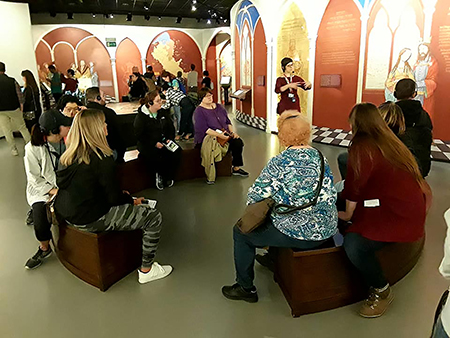
The group in Warsaw at the Museum of the History of Polish Jews.
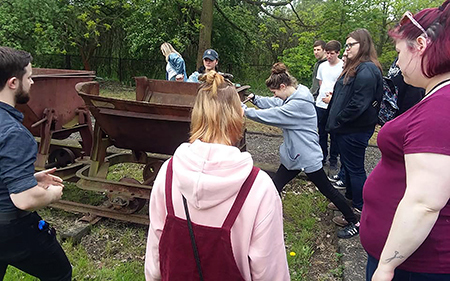
Students tried their hand pushing a cart in the outer women's penal camp.
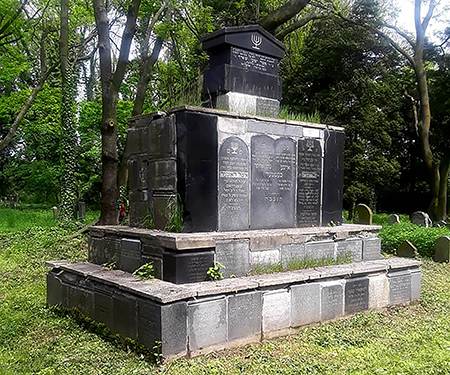
Vandalized headstones reconfigured in the Jewish Cemetery at Oświęcim, the town where Auschwitz-Birkenau is located.
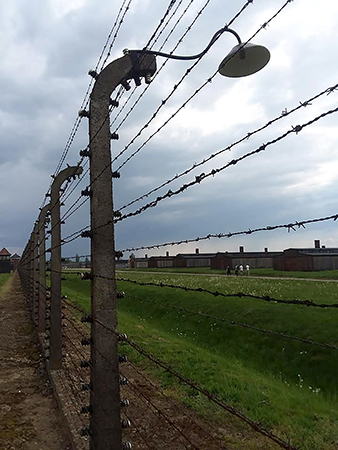
Still standing are the barbed wire fences that surround the camps.
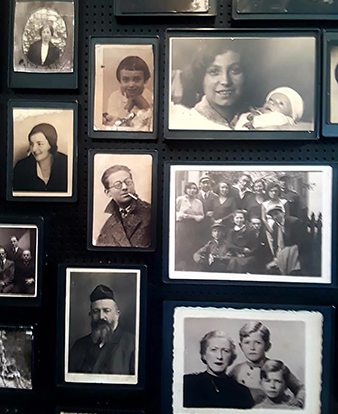 Display at Birkenau featuring photos that Jewish prisoners brought with them.
Display at Birkenau featuring photos that Jewish prisoners brought with them.
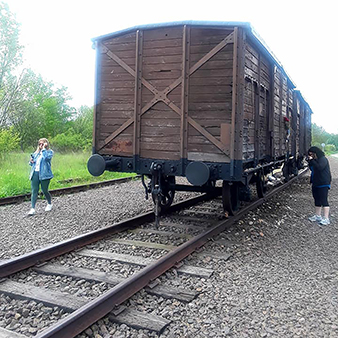
Cattle car at the Judenrampe, where Jews were brought to Birkenau.